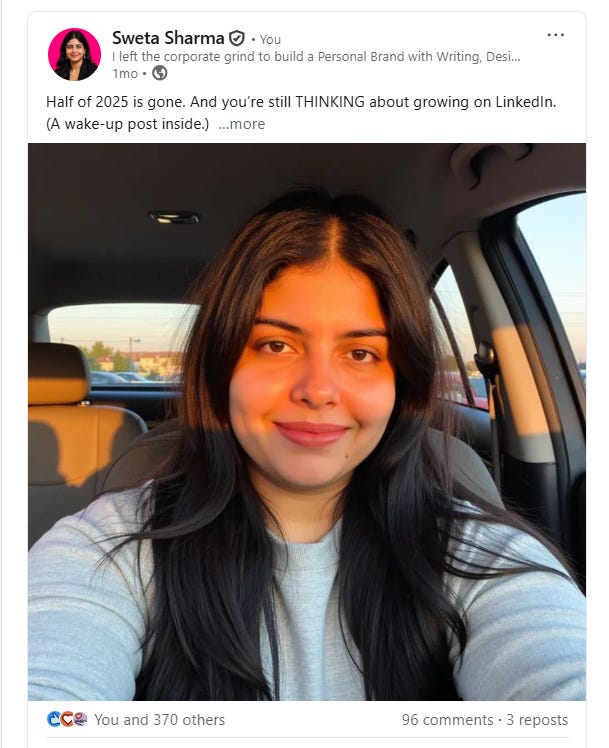5 'hidden' reasons your writing isn’t working (and how to fix each one)
I learned them after writing 500+ content pieces.
Hey Champ💖
Writing online is entirely different from what we’re told in schools and colleges (at least, that’s what I’ve felt in my journey).
Reason?
You’re catering to so many individuals with different temperaments, intelligence levels, and EQs. That’s why not all writers who start writing online stick with it for so long.
Apart from the consistency factor, there are five reasons why your writing won’t work. In this edition, I’ll be sharing those reasons with you (along with the solutions).
Let’s get straight into it.
#1- Ditch Grammar Rules…Please!
I know, I know, you might be wondering:
“What nonsense?”
“How can we ditch grammar rules when we’re supposed to publish perfect (or close to perfect) posts online?”
“How’ll someone read our stuff when we’re not even following the basics?”
See, by ditching these rules, I don’t mean forget everything. I mean, don’t bind yourself to a rulebook so tight that you stop sounding like you.
Not all online readers are PhD holders.
In fact, most of them prefer content written at a 6th to 8th grade reading level.
Solution💡: Write as simply and clearly as possible. Think about how you talk to a friend or in real life.
#2- Get to the Good Part…Fast
No one has the time to read a saga.
Your potential reader is dealing with hundreds (if not thousands) of content pieces a day!
And, if you wait for the real value of your content to appear in the 7th paragraph, 3rd line…
chances are, they’ll already be gone by then.
Solution💡: Hook them with your intro or heading and start providing value from the very first line.
#3- Long-form isn’t the winner always
There’s this notion floating around the internet that if you want to become a successful writer, you must know how to write long-form content (which is valid, no doubt).
But thinking long-form is the only way to build your space and portfolio as an online writer? That’s a stupid belief.
Short-form has equal power to get traction.
I learned this when I started posting on LinkedIn.

Fun fact: Some of the top 1% creators like Jasmin Alic and Justin Welsh are all-in on short-form content. And the engagement on their posts? Huge. Don’t believe me? See it yourself!
Solution💡: Start with short-form. Learn the basics. Then pivot to long-form.
#4- Does your writing have your IP?
One of my favorite LI creators Oana Leonte shared a post a few days ago in which she discussed the value of IP, or Intellectual Property.
Writing is also an extension of your IP.
It’s how your readers come to know:
How do you think?
What are your life experiences?
What do your core beliefs look like in action?
What’s your specific tone?
All these things combined make your writing IP.
Now, creating this IP isn’t a hunky-dory thing.
Solution💡: Write more. Practice more. Finding your voice or IP is a process, and it will only happen if you’ve taken enough reps.
#5- Day 1000 vs Day 1
This is one of the most common traps new writers fall into (including my past version). We look at someone’s 1000th post and compare it with our first draft.
And what happens next?
We start feeling guilty.
We spend hours thinking we’re not good enough.
We waste time comparing, instead of creating.
Solution 💡
Remind yourself: You’re at Day 1. And the only way to get to Day 1000 is by writing Day 2, Day 3, Day 4… and so on.
Check my old posts to see how cringe my writing used to be:)🙋♀️
That’s all for today.
See you next Saturday.
Sweta:)
If you found value in this edition, tap the 💖 button below or pass it along to someone who might enjoy it. Also, share your thoughts in the comments. I read all of them:)





Sweta ma'am, you are my inspiration on Substack. Thank you for providing us with relevant content.